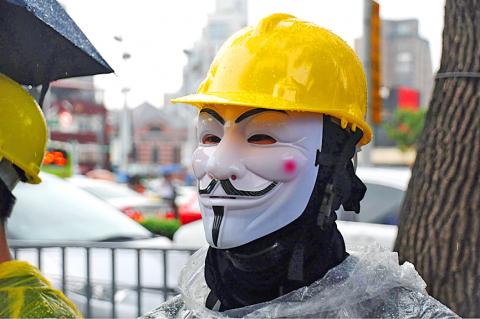Liberty Times (LT): How do you view China’s implementation of “one country, two systems” in Hong Kong over the past 22 years, including Beijing’s responses to the Occupy Central movement and the anti-extradition bill protests?
Wu Jieh-min (吳介民): China’s implementation of “one country, two systems” in Hong Kong met with two major setbacks before this year. The first was an attempt in 2003 to implement a national security bill pursuant to an obligation imposed by Article 23 of the Basic Law. The second was the 2012 protests against the proposed “moral and national education” curriculum.
From 2013 up to the 2014 Occupy Central and “Umbrella movement” protests, the Hong Kong and China governments recovered some lost ground and used a war of attrition to defeat the Hong Kong pro-democracy movement.

Photo: CNA
This year, Chinese authorities in Hong Kong might be happy seeing others on the hunt, but they severely underestimated the power of Hong Kongers to resist. As a result, they strongly pushed the extradition bill, but it was unprecedented failure for China. At this point, Beijing has completely lost face on the world stage.
Also, the internationalization of the Hong Kong problem means that China is even more troubled regarding how to deal with it. What Beijing is most worried about is that the situation will spoil celebrations marking the 70th anniversary of the People’s Republic of China (PRC). The main thinking behind its cold treatment of Hong Kong over the past month was: “First let National Day go by without a hitch, then deal with it.”
When it comes to its foreign affairs war with Taiwan, poaching two allies has been of no avail to China — the Hong Kong problem had already caused the pearl in Chinese President Xi Jinping’s (習近平) crown to lose its luster.
LT: Aside from exposing contradictions within the “one country, two systems” formula, do the anti-extradition bill protests threaten the authority of the Chinese Communist Party (CCP)?
Wu: Since the economic rise of China, the CCP has always espoused confidence in its political system and ideology, which it has written into its official documents. The party feels that China does not need to go the route of “Western” capitalist countries or the route of “Western-style” democracies.
These statements have been met with a few challenges. First, do the intellectuals and ordinary people in China feel the same way? Chinese intellectuals do not dare say that democracy is a good thing, but that is because of the threat that the authorities pose to society, and them buying people off.
Second, US-China relations in recent years have grown increasingly antagonistic. Chinese technology transfers have come under pressure from the US, causing China to retract and emphasize self-reliance.
A white paper just published to celebrate the 70th anniversary of the PRC said that “China’s development has come out of self-reliance and arduous struggle.”
Despite bragging that China is the No. 1 country in manufacturing, the white paper does not mention anywhere the “Made in China 2025” slogan that Beijing has used to express its ambition to scale up manufacturing.
Third, China’s policies aimed at Taiwan have continuously backfired. Xi’s long-term roadmap is based on his idea of the “rejuvenation of the great Chinese race,” an important goal of which is the annexation of Taiwan.
However, Taiwanese society has an incredible toughness that the CCP will not easily overcome. Xi’s way of speaking on the issue of Taiwan just goes around in circles and never gets anywhere. Democratic Taiwan just will not buy into the “one China” framework that he cannot shed. At this point in Taiwan, there are only a few opportunistic politicians who go along with it.
Finally, there are the Hong Kongers’ demands for democracy. Of the five demands that they have presented, the most difficult for Beijing is the one for universal suffrage. They want to choose not only the Hong Kong chief executive, but also all of the legislators in the Hong Kong Legislative Council.
LT: Aside from the five demands, some Hong Kong protesters have called for Hong Kong independence. How do you see things developing in the face of such disruptive demands?
Wu: In Taiwan, there has long been a dispute between independence supporters and those espousing unification with China. However, in the face of intensifying aggression from the Chinese government over the past few years, the conversation has turned toward discussing a framework for protecting Taiwan and opposing the CCP, or opposing China.
Beijing itself has unintentionally been the impetus for this change and fostered the birth of a generation of people who consider themselves to be “naturally independent” from China. The situation today is one of convergence between Taiwanese-independence advocates and those advocating the independence of the Republic of China. The bottom line is an absolute opposition to Taiwan falling into the hands of the totalitarian CCP.
The more Xi pushes his “one country, two systems” offensive, the more the majority of Taiwanese will express to Xi: “I don’t want to be part of the same country as you.”
It is really quite bizarre: Xi has become the greatest catalyst for a “protect Taiwan, oppose communism” movement.
Translated by staff writer William Hetherington

A magnitude 6.4 earthquake struck off the coast of Hualien County in eastern Taiwan at 7pm yesterday, the Central Weather Administration (CWA) said. The epicenter of the temblor was at sea, about 69.9km south of Hualien County Hall, at a depth of 30.9km, it said. There were no immediate reports of damage resulting from the quake. The earthquake’s intensity, which gauges the actual effect of a temblor, was highest in Taitung County’s Changbin Township (長濱), where it measured 5 on Taiwan’s seven-tier intensity scale. The quake also measured an intensity of 4 in Hualien, Nantou, Chiayi, Yunlin, Changhua and Miaoli counties, as well as

Credit departments of farmers’ and fishers’ associations blocked a total of more than NT$180 million (US$6.01 million) from being lost to scams last year, National Police Agency (NPA) data showed. The Agricultural Finance Agency (AFA) said last week that staff of farmers’ and fishers’ associations’ credit departments are required to implement fraud prevention measures when they serve clients at the counter. They would ask clients about personal financial management activities whenever they suspect there might be a fraud situation, and would immediately report the incident to local authorities, which would send police officers to the site to help, it said. NPA data showed

ENERGY RESILIENCE: Although Alaska is open for investments, Taiwan is sourcing its gas from the Middle East, and the sea routes carry risks, Ho Cheng-hui said US government officials’ high-profile reception of a Taiwanese representative at the Alaska Sustainable Energy Conference indicated the emergence of an Indo-Pacific energy resilience alliance, an academic said. Presidential Office Secretary-General Pan Men-an (潘孟安) attended the conference in Alaska on Thursday last week at the invitation of the US government. Pan visited oil and gas facilities with senior US officials, including US Secretary of the Interior Doug Burgum, US Secretary of Energy Chris Wright, Alaska Governor Mike Dunleavy and US Senator Daniel Sullivan. Pan attending the conference on behalf of President William Lai (賴清德) shows a significant elevation in diplomatic representation,

The Taipei City Reserve Command yesterday initiated its first-ever 14-day recall of some of the city’s civilian service reservists, who are to undergo additional training on top of refresher courses. The command said that it rented sites in Neihu District (內湖), including the Taipei Tennis Center, for the duration of the camp to optimize tactical positioning and accommodate the size of the battalion of reservists. A battalion is made up of four companies of more than 200 reservists each, it said. Aside from shooting drills at a range in New Taipei City’s Linkou District (林口), the remainder of the training would be at